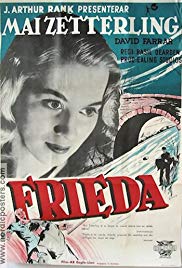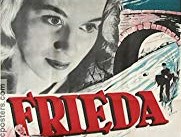Frieda *** (1947, David Farrar, Glynis Johns, Mai Zetterling, Flora Robson, Albert Lieven, Gladys Henson, Patrick Holt) – Classic Movie Review 8269

Director Basil Dearden makes an honourable job of the 1947 black and white drama Frieda, a thoughtful Ealing Studios World War Two message story about an RAF pilot officer (David Farrar) who comes back to his English village after being shot down in the war, with his new German wife, Frieda (Mai Zetterling), who abetted his flight from the Nazis. Initially, and unsurprisingly, the locals reject her and her pro-Hitler brother (Albert Lieven).
Remarkably conceived as a tale to encourage British national forgiveness after World War Two, this is very much a film of its period, and, though adequately produced, it looks a little dusty today. Glynis Johns and Flora Robson (as Farrar’s sister and aunt, an anti-German MP) help to enliven the action and the two stars’ excellent, unmannered performances make the result still watchable.
The screenplay by Angus MacPhail and Ronald Millar adapts the play by Ronald Millar. The film is based on fact but the characters and events portrayed are fictitious, though any similarity to any name or individual is coincidental.
Also in the cast are Gladys Henson, Patrick Holt, Milton Rosmer, Barbara Everest, Ray Jackson, Barry Jones, Garry Marsh, Gilbert Davis, Renée Gadd, Douglas Jefferies, Eliot Makeham, Norman Pierce, John Ruddock, D A Clarke-Smith, Aubrey Mallalieu, John Molecey, Stanley Escane, Gerard Heinz and Arthur Howard.
Frieda is directed by Basil Dearden, runs 98 minutes, is made by Ealing Studios, is released by General Film Distributors, is written by Angus MacPhail and Ronald Millar, is shot in black and white by Gordon Dines, is produced by Michael Relph and is scored by John Greenwood.
© Derek Winnert 2019 Classic Movie Review 8269
Check out more reviews on http://derekwinnert.com


